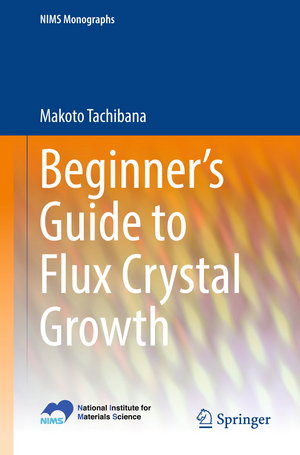Beginner’s Guide to Flux Crystal Growth: NIMS Monographs
Autor Makoto Tachibanaen Limba Engleză Paperback – 8 noi 2017
Preț: 789.89 lei
Preț vechi: 963.29 lei
-18% Nou
Puncte Express: 1185
Preț estimativ în valută:
151.15€ • 161.63$ • 126.02£
151.15€ • 161.63$ • 126.02£
Carte tipărită la comandă
Livrare economică 18 aprilie-02 mai
Preluare comenzi: 021 569.72.76
Specificații
ISBN-13: 9784431565864
ISBN-10: 4431565868
Pagini: 132
Ilustrații: IX, 130 p. 63 illus., 41 illus. in color.
Dimensiuni: 155 x 235 mm
Greutate: 2.23 kg
Ediția:1st ed. 2017
Editura: Springer
Colecția Springer
Seria NIMS Monographs
Locul publicării:Tokyo, Japan
ISBN-10: 4431565868
Pagini: 132
Ilustrații: IX, 130 p. 63 illus., 41 illus. in color.
Dimensiuni: 155 x 235 mm
Greutate: 2.23 kg
Ediția:1st ed. 2017
Editura: Springer
Colecția Springer
Seria NIMS Monographs
Locul publicării:Tokyo, Japan
Cuprins
Introduction.- Mechanisms of crystal growth from fluxed solution.- Phase diagrams for flux growth.- Choosing a flux.- Equipment and experimental procedures.- Examples of flux-grown crystals.
Textul de pe ultima copertă
This book introduces the principles and techniques of crystal growth by the flux method, which is arguably the most useful way to obtain millimeter- to centimeter-sized single crystals for physical research. As it is possible to find an appropriate solvent (“flux”) for nearly all inorganic materials, the flux method can be applied to the growth of many crystals ranging from transition metal oxides to intermetallic compounds. Both important principles and experimental procedures are described in a clear and accessible manner. Practical advice on various aspects of the experiment, which is not readily available in the literature, will assist the beginning graduate students in setting up the lab and conducting successful crystal growth. The mechanisms of crystal growth at an elementary level are also provided to better understand the techniques and to help in assessing the quality of the crystals. The book also contains many photographs of beautiful crystals with important physical properties of current interest, such as high-temperature superconductors, strongly correlated electronic systems, topological insulators, relaxor ferroelectrics, low-dimensional quantum magnets, non-linear optical materials, and multiferroics.
Caracteristici
Provides detailed descriptions and advice on experimental procedures, assisting the reader in performing successful growth of single crystals Helps the reader grasp the underlying principles of flux crystal growth Contains more than 25 photographs of beautiful crystals of current interest in the fields of condensed matter physics, applied physics, and mineralogy Includes an appendix that lists many examples of single crystals grown by the flux method Includes supplementary material: sn.pub/extras












